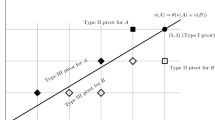Abstract.
We provide intuitive, formal, and computational evidence that in a large society Condorcet’s paradox (the intransitivity of social preference obtained by pairwise vote) can hardly occur. For that purpose, we compare two models of social choice, one based on voting and another one based on summing individual cardinal utilities, expressed either in reals, or integers. We show that in a probabilistic model with a large number of independent individuals both models, almost surely, provide the same decision results. This implies that Condorcet’s and Borda’s methods tend to give the same decisions as the number of voters increases. Therefore, in the model with a large number of voters, the transitivity of the Borda preference is inherent in a majority preference as well.
Similar content being viewed by others
Author information
Authors and Affiliations
Additional information
Received: 26 June 1998/Accepted: 16 April 1999
Rights and permissions
About this article
Cite this article
Tangian, A. Unlikelihood of Condorcet’s paradox in a large society. Soc Choice Welfare 17, 337–365 (2000). https://doi.org/10.1007/s003550050024
Issue Date:
DOI: https://doi.org/10.1007/s003550050024




